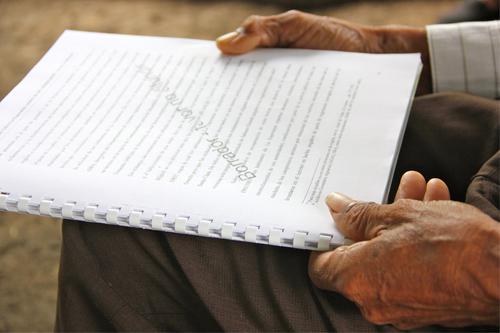当前位置:
X-MOL 学术
›
American Ethnologist
›
论文详情
Our official English website, www.x-mol.net, welcomes your feedback! (Note: you will need to create a separate account there.)
Collaborative anthropology, work, and textual reception in a Mexican Nahua village
American Ethnologist ( IF 1.906 ) Pub Date : 2020-09-16 , DOI: 10.1111/amet.12913 ANATH ARIEL DE VIDAS 1
American Ethnologist ( IF 1.906 ) Pub Date : 2020-09-16 , DOI: 10.1111/amet.12913 ANATH ARIEL DE VIDAS 1
Affiliation

|
Since the 1980s, anthropologists have been valorizing the notion of working together with their research participants to produce knowledge. But what happens when the anthropologist's notion of collaboration differs radically from that of the people with whom he or she wishes to collaborate? My initial attempt at such collaboration with indigenous Nahua people in a Mexican village seemed to fail miserably, yet, over time, the situation changed. Reflecting on the misunderstandings surrounding our discussions on the first drafts of my book about the village provides a glimpse of the cultural context in which the interaction was forged. It raises questions about literacy, the authority of knowledge, and my interlocutors’ views of social relationships. In particular, an understanding of the local notion of work proved crucial to grasping the evolution of these exchanges. The latter reveal Nahua ontologies as well as my own. [collaborative anthropology, reflexivity, work, textual reception, literacy, methodology, indigenous people, Nahua, Mexico]
中文翻译:

墨西哥纳瓦村的人类学,工作和文字交流合作
自1980年代以来,人类学家一直重视与研究参与者合作产生知识的观念。但是,当人类学家的合作理念与他或她希望与之合作的人们的理念截然不同时,会发生什么呢?我最初与墨西哥村庄的纳瓦族土著居民进行这种合作的最初尝试似乎失败了,但随着时间的流逝,情况发生了变化。反思围绕我们在有关村庄的书的初稿中进行讨论的误解,可以窥见形成互动的文化背景。它提出了关于读写能力,知识权威以及我的对话者对社会关系的看法的问题。特别是,理解当地的工作观念对掌握这些交流的发展至关重要。后者揭示了Nahua本体以及我自己的本体。[合作人类学,反思性,工作,文本接受,识字,方法论,土著人民,纳瓦,墨西哥]
更新日期:2020-09-16
中文翻译:

墨西哥纳瓦村的人类学,工作和文字交流合作
自1980年代以来,人类学家一直重视与研究参与者合作产生知识的观念。但是,当人类学家的合作理念与他或她希望与之合作的人们的理念截然不同时,会发生什么呢?我最初与墨西哥村庄的纳瓦族土著居民进行这种合作的最初尝试似乎失败了,但随着时间的流逝,情况发生了变化。反思围绕我们在有关村庄的书的初稿中进行讨论的误解,可以窥见形成互动的文化背景。它提出了关于读写能力,知识权威以及我的对话者对社会关系的看法的问题。特别是,理解当地的工作观念对掌握这些交流的发展至关重要。后者揭示了Nahua本体以及我自己的本体。[合作人类学,反思性,工作,文本接受,识字,方法论,土著人民,纳瓦,墨西哥]



























 京公网安备 11010802027423号
京公网安备 11010802027423号